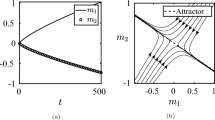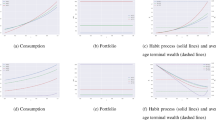Abstract
The paper studies a situation in which agents can make a binding agreement both on the amount of local public goods and on the structure of networks through which they share the benefits of public goods. An agent enjoys the benefit of public goods produced by other agents who are (directly or indirectly) connected to him. There is a cost to maintain a link as well as to produce a public good. Because agents can choose the amount of public goods, the value of a link is endogenously determined. We consider two different models of sequential bargaining games through which a contract on allocations is established. In the first model, we allow agents to propose a pure allocation and show that there is no symmetric stationary perfect equilibrium for sufficiently patient agents. In the second model, agents are allowed to propose a distribution on allocations. As a result, we find a symmetric stationary perfect equilibrium in which probabilistic choices are made on an equivalent class of allocations. Subsequently, we characterize core allocations, which consist of a minimally connected network and an effort profile, in which at most one agent does not produce the maximum amount of public good.
Similar content being viewed by others
References
Bala V, Goyal S (2000) A noncooperative model of network formation. Econometrica 68(5): 1181–1230
Bogomolnaia A, Moulin H (2004) Random matching under dichotomous preferences. Econometrica 72(1): 257–279
Bramoullé Y, Kranton R (2007) Public goods in networks. J Econ Theory 135(1): 478–494
Chatterjee K, Sabourian H (2000) Multiperson bargaining and strategic complexity. Econometrica 68(6): 1491–1510
Chatterjee K, Dutta B, Ray D, Sengupta K (1993) A noncooperative theory of coalitional bargaining. Rev Econ Stud 60(2): 463–477
Dutta B, Mutuswami S (1997) Stable networks. J Econ Theory 76(2): 322–344
Galeotti A, Goyal S (2008) The law of the few. Mimeo. University of Essex
Galeotti A, Goyal S, Jackson MO, Vega-Redondo F, Yariv L (2007) Network games. Mimeo. University of Essex.
Granovetter M (1974) Getting a job: a study of contacts and careers. University of Chicago Press, Chicago
Gul F (1989) Bargaining foundations of Shapley value. Econometrica 57(1): 81–95
Hojman DA, Szeidl A (2006) Endogenous networks, social games, and evolution. Games Econ Behav 55(1): 112–130
Hojman DA, Szeidl A (2008) Core and periphery in networks. J Econ Theory 139(1): 295–309
Jackson MO, van den Nouweland A (2005) Strongly stable networks. Games Econ Behav 51(2): 420–444
Jackson MO, Watts A (2002) On the formation of interaction networks in social coordination games. Games Econ Behav 41(2): 265–291
Jackson MO, Wolinsky A (1996) A strategic model of social and economic networks. J Econ Theory 71(1): 44–74
Ray D, Vohra R (1999) A theory of endogenous coalition structures. Games Econ Behav 26(2): 286–336
von Hippel E (1988) The sources of innovation. Oxford University Press, New York
Author information
Authors and Affiliations
Corresponding author
Additional information
This paper is based on Chapter 3 of my Ph.D. dissertation at The Pennsylvania State University.
Rights and permissions
About this article
Cite this article
Cho, M. Endogenous formation of networks for local public goods. Int J Game Theory 39, 529–562 (2010). https://doi.org/10.1007/s00182-009-0182-5
Accepted:
Published:
Issue Date:
DOI: https://doi.org/10.1007/s00182-009-0182-5




